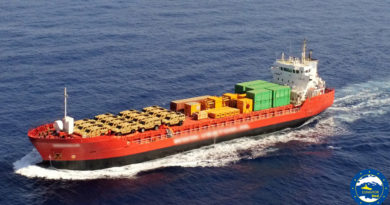EU Experts Continue to Assess State Border Crossings of Ukraine
The assessment covered highway (Novi Yarylovychi), air (Boryspil), railway (Kuchurhan) and sea (Yuzhnyi Sea Port, Odessa Commercial Sea Port) border crossing points and was another step towards improving border and customs control processes and procedures
On November 23-24, 2020 European experts together with experts of the State Border Guard Service of Ukraine (SBGS) and the State Customs Service of Ukraine (SCS) conducted a regular mission to assess checkpoint across the Ukrainian-Bilorusian and Ukrainian-Moldovan borders. The mission was the second activity to analyse border and customs control processes and procedures at border crossing points under the EU-funded project “Support of the EU in Strengthening Integrated Border Management in Ukraine (EU4IBM)”.
The assessment covered highway (Novi Yarylovychi), air (Boryspil), railway (Kuchurhan) and sea (Yuzhnyi Sea Port, Odessa Commercial Sea Port) border crossing points and was another step towards improving border and customs control processes and procedures at BCPs.
“The best way to see how these or those processes are actually happening, in addition to conducting an assessment here in Kiev, is to visit the border crossing points directly and simulate border crossing for goods and people. A step-by-step border crossing with a fixed waiting time can help identify gaps and create a new, optimised process, contribute to improving control procedures at checkpoints, thus making inspections more efficient, faster and safer,” – said Arūnas Adomenas, EU4IBM project manager.
During the visits to the checkpoints, the assessment team, including European experts and employees of the SBGS and the SCS, conducted a detailed analysis of border and customs control procedures from the moment of entry into the customs territory of Ukraine until the moment of departure from the BCP. The assessment included an analysis of the processing of passengers and goods at crossing points for highway, railway, sea and air traffic, as well as an analysis of the current situation at the respective crossing points. The main task is to identify gaps and develop recommendations and model solutions that will reduce time and resources for relevant processes at check points, ensuring a fast and safe border crossing for people and goods.
In the coming months, based on the findings of the mission and the data collected, the project experts will work on detailed recommendations and action plans for their implementation in parallel with the development of the model crossing point concepts.
“Open but well managed, controlled and secure borders are one of the main objectives of the Integrated Border Management Strategy of Ukraine. The EU, as a long-term partner of Ukraine, shares this goal and provides ongoing and comprehensive support in this direction,” commented Xavier Camus, Head of Section “Good Governance and Democratisation” of the EU Mission in Ukraine.
Once the relevant concepts have been developed and approved by the SBGSU and the SCSU, EU4IBM will provide support for their implementation to ensure quality service to citizens, promote regional cooperation, cross-border trade and human contacts, and enable citizens and businesses to benefit from increased mobility and integration into global economic activity – everything in combination with a high level of border security and prevention of cross-border crime.
The project “EU Support to Strengthening Integrated Border Management in Ukraine (EU4IBM)”, funded by the European Union and implemented by the International Centre for Migration Policy Development (ICMPD), aims to support reforms that bring Ukraine’s border management system closer to European Union standards and best practices under the Integrated Border Management Strategy of Ukraine. The project is being implemented from December 2019 to June 2022.




